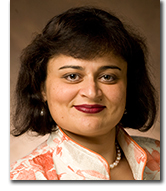
- professor of Classics and core faculty at the Havighurst Center for Russian and Post-Soviet Studies
- from Yerevan, Armenia via Moscow, Russia
- teaches classics courses from foundation classes to graduate level
- published a book, Vergil in Russia: National Identity and Classical Reception, in January 2015
Background
"I got my BA in Classical Philology and Russian Literature at Moscow State University in Russia and then came to the U.S. to attain three of my advanced degrees, including my PhD in Classics, at Columbia University in New York.
"The way European education is set up is very different from the American system. At the age of 16 when I graduated from high school, we were required to choose a specific field before entering university. I wanted to study foreign languages, and my foundational experience for that was classics, namely Greek and Latin."
Teaching
"I divide my teaching between the Department of Classics and the Havighurst Center for Russian and Post-Soviet Studies. At the Havighurst Center, I teach introductory courses on Russian, Eurasian and Eastern European studies as well as a course called Reception of Antiquity in Russian Literature. This semester I am also teaching a Havighurst Colloquia, which features six invited speakers from different universities across the nation and attracts advanced undergraduate and graduate students at Miami. In classics, I teach a range of classes, from foundational experiences to advanced undergraduate courses.
"I really like teaching because I like being exposed to young people, who have a lot of fresh ideas. Sometimes I just let them read literature without lecturing or telling them what I think, because I want to know their impressions first. It's interesting how they look at the text with absolutely fresh eyes! My students also give me some of my ideas for my own research. Whenever they express interest in certain things and find them exciting, that helps me gauge the interest in whatever I'm writing about.
"Miami students are very responsive, active, and great at participation in discussion and writing papers. I try to integrate scholarship into teaching; I don't like them being separate. That's what I enjoy about teaching: just writing something and then teaching it!
"I never lecture, even in big foundation classes. Instead, I try to have what is called a flipped classroom. I assign students readings, and then we all actually talk about them. I want to know what they found important, what is interesting, what they got out of it—as opposed to me imposing on them what I find important. If they need help with the readings, they can go and consult my lecture notes, which I post online. I just want to discuss and see where it takes us.
"It really doesn't matter what major you have—if you can't write, you will not succeed. I always tell students to take humanities courses, even if they're not majoring in it. You will be better off in your future life, whether you're a lawyer, doctor, teacher, or accountant. Many of my students move on to different and at times rather lucrative professions, and they always tell me that it was the classics literature courses that helped them get to where they are."
Research
"Since coming to Miami I've published three books, about 14 articles, and three edited volumes. My last book, Vergil in Russia: National Identity and Classical Reception, came out via Oxford University Press in January 2015. This book focuses on the field of classical reception in Russia and looks at how the works of Greek and Roman literature and art are absorbed by a modern culture and what a specific modern culture gets out of it. I teach on this subject and incorporate all of my research into my classes. I also publish on that extensively."
Outside the Classroom
"I really enjoy traveling, running, and spending time with my husband and children."
[August 2015]
 Miami University Oxford, Ohio est. 1809
College of Arts and Science
Miami University Oxford, Ohio est. 1809
College of Arts and Science
 Miami University Oxford, Ohio est. 1809
College of Arts and Science
Miami University Oxford, Ohio est. 1809
College of Arts and Science